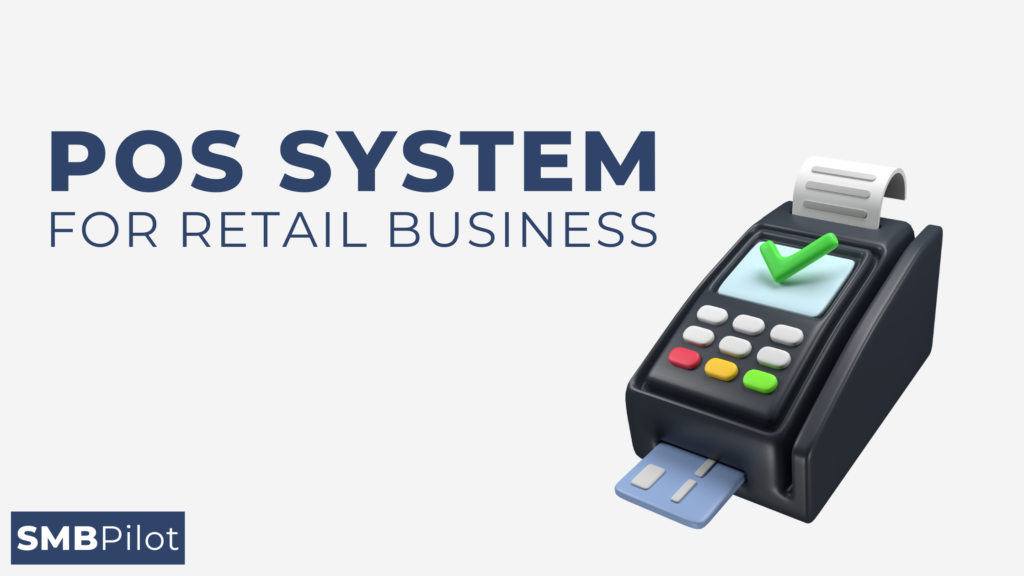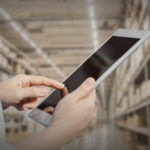Are the daily challenges of running your retail business causing you stress and frustration? Picture a solution that could simplify your operations and boost your profits quickly. Introducing our advanced POS system, designed specifically for businesses like yours. With our system, you’ll experience effortless inventory management, lightning-fast sales processing, and valuable reporting at your fingertips. Say goodbye to inventory headaches, long customer queues, and missed sales opportunities.
Imagine a retail world where your inventory is always perfectly handled, with real-time stock updates and automated reorder alerts. Visualise satisfied customers enjoying quick transactions and personalised promotions through our powerful customer relationship management tool. Envision a future where your business thrives and you have more time to concentrate on growth. Don’t miss out on the chance to transform your retail business. Take the first step towards a brighter future now. Contact us for a personalised demo and witness how our POS system can turn your retail aspirations into reality. Your success journey starts here.
Quick Links
Company | Starting Price | Rating | Features |
Square 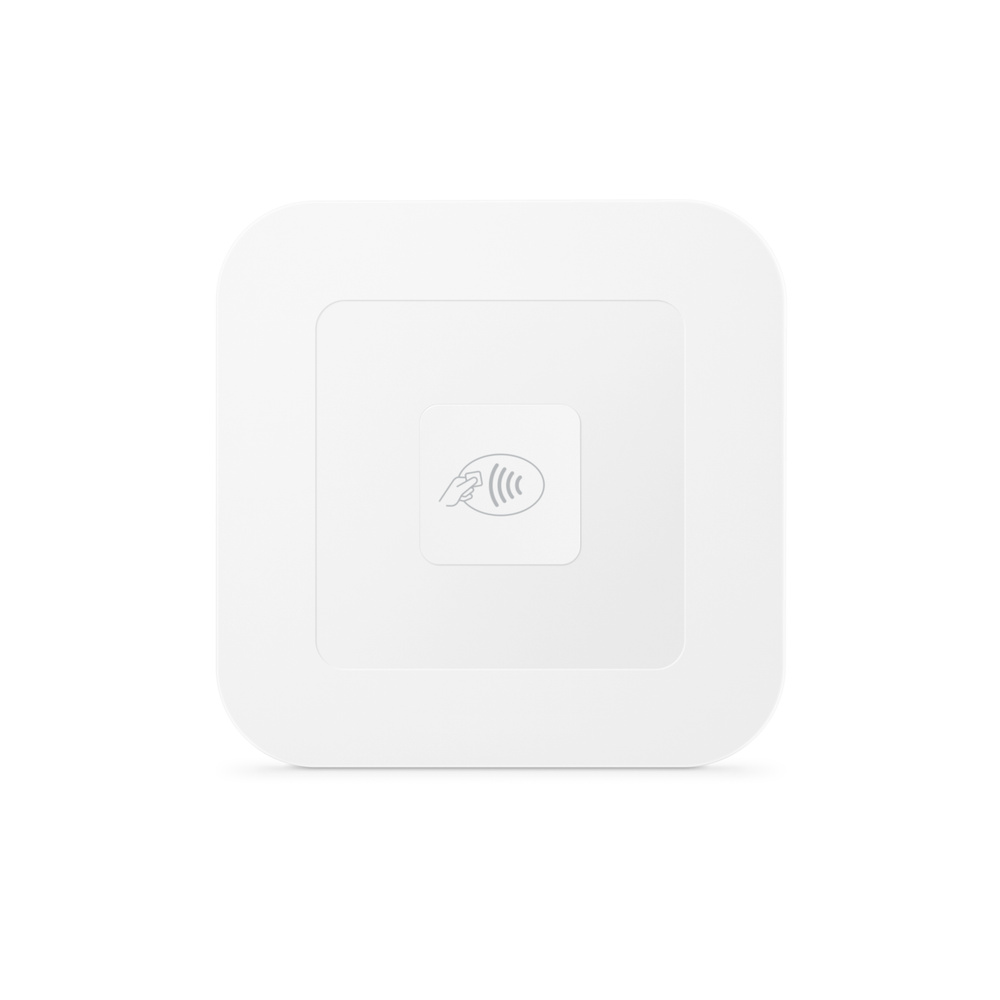 | Free, hardware extra | Inventory management, omnichannel selling, user-friendly | |
Lightspeed  | £55 per month (billed annually) | Inventory Management | |
SumUp  | Free; £31per card reader | Inventory management, no minimums, no contracts | |
Zettle by PayPal  | Free; £25 for your first card reader | Invoicing and inventory management | |
Shopify  | £35 per month | Staff management, multi-location inventory management, split payments |
1. Square POS System For Retail Businesses
Regarding retail businesses, Square is an exceptional choice for a hassle-free POS system. Designed with simplicity and efficiency, Square is ideal for new and established retail ventures.
Its intuitive interface, ease of use, and transparent pricing set it apart.

Square offers various hardware options, including the Square Reader, an entry-level card reader that provides a simple and cost-effective way to process payments quickly. For businesses looking to elevate their operations, the Square Stand turns your iPad into a sophisticated POS system with customer-driven checkout and an integrated card reader.
With Square, you won’t be tied into lengthy contracts, allowing you to adapt as your business evolves. The pricing is straightforward, making it easy to calculate your costs.
Square is known for its user-friendly approach, ensuring that your staff can quickly learn and use the system with minimal training.
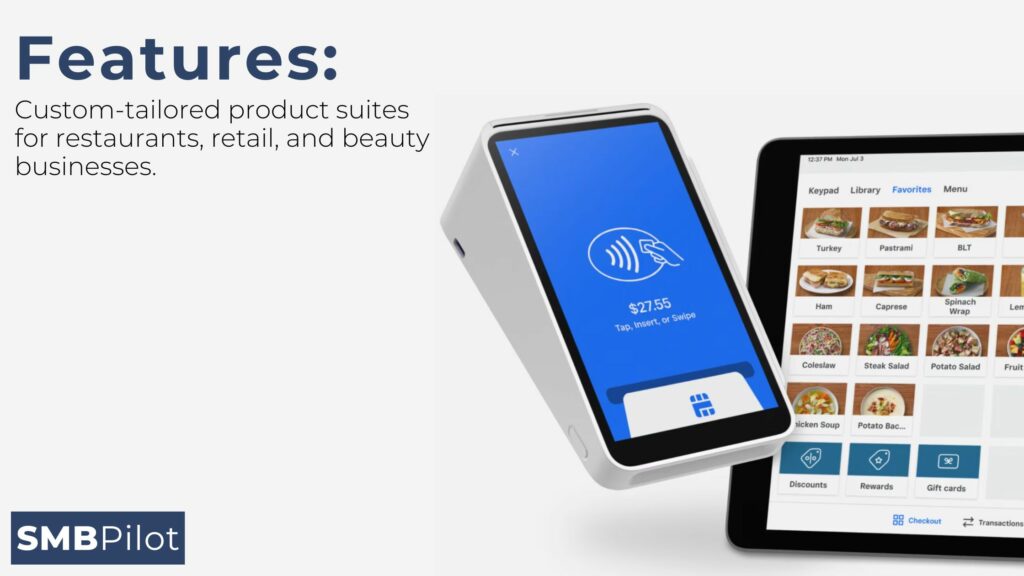
Square For Retail Features
✓ Integrated Reporting: Effortlessly track sales trends, customer behaviour, and employee performance through simplified reporting and analytics on your dashboard.
✓ Customisable Receipts: Personalise your receipts with your brand logo and additional text.
✓ Multiple Payment Options: Accept various payment methods, including credit/debit cards, mobile payments like Apple Pay, and invoicing.
✓ Basic Inventory Management: Stay on top of your stock levels and avoid understocking with Square’s essential inventory tracking features, including low stock alerts.
✓ Instant Set Up: Square’s intuitive design ensures that your staff can quickly learn and use the system with minimal training.
Square Retail Pricing
Here is the pricing table in Markdown format:
| Fee | Cost |
|---|---|
| Software | Free |
| Setup fees | £0 |
| Monthly subscription | £0 |
| Transaction rates (Chip & PIN / Contactless) | 1.75% |
| Transaction rates (Virtual Terminal / Invoices) | 2.5% |
| Transaction rates (Online with UK cards) | 1.4% + £0.25 |
| Transaction rates (Online with non-UK cards) | 2.5% + £0.25 |
| POS hardware starting at | £19 + VAT (with Square Reader) |
Understanding Square’s pricing is essential. They utilise a blended transaction rate model, where merchants pay a fixed percentage fee for every card transaction, irrespective of the card type or issuing bank.
In contrast, providers with fixed contracts typically employ an interchange-plus pricing structure, wherein the charges vary depending on the card type. For instance, debit card transactions might incur lower fees than credit cards. While contracts have downsides, interchange-plus pricing tends to be more cost-effective, especially for larger businesses.
Pros
User-friendly Interface: Square boasts a user-friendly interface designed to simplify operations, reducing the learning curve for new employees.
Cost-effectiveness: The free tier offers substantial value to startups and small businesses. Plus, Square’s pricing model scales seamlessly as your business grows, ensuring you pay only for what you need.
Rapid Setup: Square enables you to get your POS system up and running swiftly, often within a day. This speedy implementation frees up your time to focus on other critical aspects of your new business venture.
Scalability: Square grows with your business. As you expand, you have the option to upgrade to Square Premium, priced at just £49 per month, to access a broader range of sophisticated features.
Cons
Limited Advanced Features: While Square is ideal for new businesses, its feature set may not fully support the needs of larger or more complex retail operations.
Blended Transaction Fees: Square’s blended fee structure simplifies cost predictions but could potentially be more expensive for specific transaction types or higher volumes, making it important to consider your business’s unique requirements.
2. Lightspeed – Best for Multi-Store Retailers
Lightspeed offers a robust POS solution tailor-made for retail businesses with multiple stores. In my evaluation, it stands out as the most technically advanced retail POS system on the market, brimming with impressive functionalities.
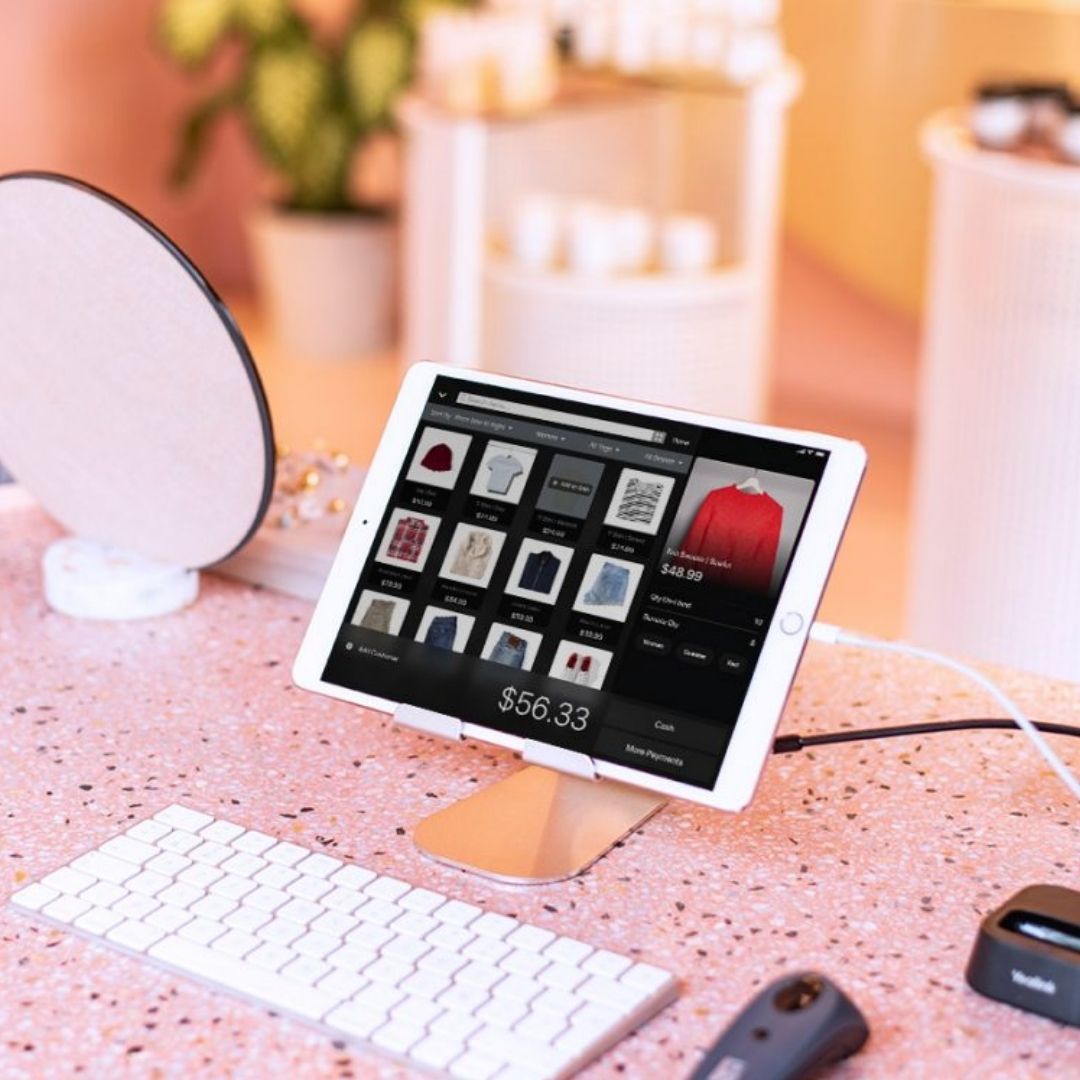
To begin with, Lightspeed boasts a comprehensive suite of features, including inventory management, purchase ordering, loyalty programs, advanced analytics, and reporting, alongside seamless e-commerce integration.
During real-world testing, I found Lightspeed Retail’s inventory management system particularly outstanding. It empowers businesses to monitor inventory levels across various locations in real-time, automatically synchronise data, and automate purchase orders. This significantly reduces inventory shrinkage, enhances operational efficiency, and streamlines supply chain management.
Lightspeed Retail also excels in customer management. Businesses can create customer profiles, track loyalty points, and execute personalised marketing campaigns, thereby enhancing customer engagement.
In addition, Lightspeed POS provides robust e-commerce functionality and integrates seamlessly with popular e-commerce platforms like Shopify. This allows you to manage both online and in-store sales from a unified platform, with real-time analytics and reports providing valuable insights into sales trends, performance metrics, and customer behavior. Such detailed insights set Lightspeed apart and can have a substantial impact on your profitability.
| Pricing Information | Options |
|---|---|
| Pricing Tiers | Monthly Cost (GBP) |
| Lean | £59/month, includes 1 register, integrated payments, 24/7 customer support (1.6% card-present rate) |
| Standard | £79/month, includes 1 register, integrated payments, accounting features, omnichannel loyalty, 24/7 customer support (1.6% card-present rate) |
| Advanced | £119/month, includes 1 register, integrated payments, B2B catalog, advanced reporting, dedicated account manager, 24/7 customer support (1.6% card-present rate) |
| Additional Information | |
| Payment Processing Fees | Transaction fees ranging from 2.6% to 2.9% depending on the chosen plan |
| Free Trial Period | 30-day free trial |
| Hardware | Lightspeed does not provide hardware; it operates as a cloud-based iPad POS system |
Features
✓ Inventory management with real-time synchronisation across multiple locations
✓ Comprehensive sales analytics and reporting
✓ Customer profiles and loyalty programs
✓ Omnichannel visibility into inventory, customer data, and sales
✓ Cash drawer controls and payment processing
✓ Accessibility from multiple devices/terminals
✓ Round-the-clock customer support.
✓ Employee permissions and payroll management
✓ Order management for in-store and online sales
✓ Integrated accounting
✓ Automated purchase ordering.Integrated accounting
✓ Omnichannel visibility into inventory, customer data, and sales
✓ Barcode scanning and support for receipt printers
✓ Custom pricing, discounts, and promotional capabilities
✓ Returns and exchanges management
Pricing
| Pricing Information | Monthly Cost (GBP) | Card Rate |
|---|---|---|
| Lean | £59/month | 1.6% |
| Standard | £79/month | 1.6% |
| Advanced | £119/month | 1.6% |
Pros
Comprehensive feature set, including inventory management, purchase ordering, customer profiles, loyalty programs, advanced analytics, and e-commerce integration.
User-friendly interface.
Scalable to accommodate the needs of growing businesses.
Cloud-based, enabling access from anywhere.
24/7 customer support.
Cons
Can be relatively expensive for small businesses.
Some users have reported issues with the reporting functionality.
The e-commerce platform, while functional, may not replace dedicated solutions like Shopify.
3. SumUp – Best For Small & Micro Retail Businesses
SumUp was founded in 2011 in London, UK, with a mission to make card payments accessible to small and micro-merchants globally. Since then, it has grown into a trusted global mPOS provider, serving millions of businesses in over 30 countries. SumUp is known for its simplicity, affordability, and ease of use, which have made it a popular choice among small businesses and solo entrepreneurs.

SumUp can be an excellent choice for small and micro-retail businesses, particularly those with limited transaction volumes and simple operational needs. Its affordability, ease of use, and mobility make it a practical solution for many retailers. However, larger or more complex retail operations with advanced requirements may need to explore more feature-rich POS systems to meet their specific needs. It’s essential to assess your business’s unique requirements and compare SumUp with other POS options to determine the best fit for your retail venture.
SumUp Pricing For Retail Businesses
| Plan | Monthly Cost | Card Rate |
|---|---|---|
| SumUp Solo | £0 | 1.69% |
| SumUp 3G Card Reader | £19 | 1.69% |
| SumUp 3G Plus Card Reader | £19 | 1.69% |
| SumUp Air Card Reader | £19 | 1.69% |
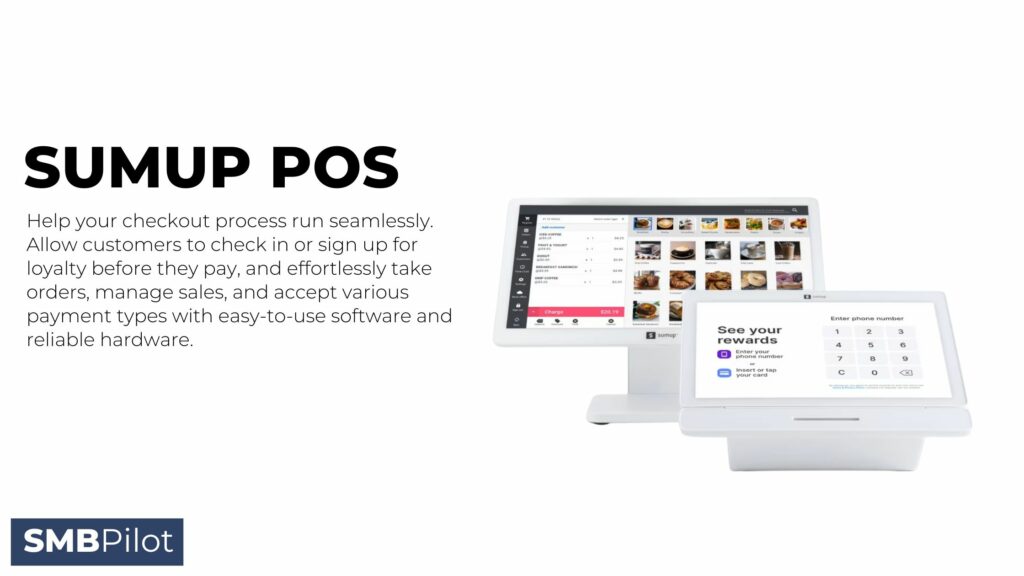
SumUp Features
✓ Card Reader: SumUp offers a variety of card readers, including the SumUp Air and SumUp 3G, which connect wirelessly to your mobile device. These readers accept chip and PIN, contactless payments (NFC), and even mobile wallets like Apple Pay and Google Pay.
✓ Receipt Options: SumUp lets you send digital receipts to customers via email or SMS, reducing paper waste and enhancing customer engagement.
✓ Mobile App: The SumUp mobile app, available for iOS and Android devices, serves as the control center for your business. It allows you to process payments, view transaction history, and manage your products and pricing.
✓ Sales Analytics: Access valuable sales data and insights through the SumUp app, helping you make informed business decisions.
✓ Inventory Management: While not as advanced as some other POS systems, SumUp’s inventory management feature helps you track your products and stock levels.
Pricing
SumUp’s pricing is designed to be transparent and affordable, making it an attractive option for small businesses. Here’s an overview of their pricing structure (specific rates may vary by region):
| Feature | Details |
|---|---|
| Transaction Fees | 1.69% fee per transaction for chip and PIN, contactless, and mobile wallet payments in the UK. |
| Monthly Fees | No monthly subscription fees, providing a cost-effective solution. |
| Long-Term Contracts | No long-term contracts, offering flexibility for your evolving business. |
| SumUp Card | SumUp Card available, a prepaid business Mastercard for instant fund access and business-related purchases. |
Pros
Easy to set up and use, with no technical expertise required.
Affordability with straightforward transaction fees.
Ideal for small businesses and micro-merchants.
Excellent compatibility with a wide range of mobile devices.
Fast and responsive customer support.
Cons
Transaction fees may not be the most cost-effective for high-volume businesses.
Limited advanced features compared to more comprehensive POS systems.
Dependency on a stable internet connection for payment processing may be a drawback in areas with poor connectivity.
4. Zettle by PayPal
Zettle by PayPal is a popular point-of-sale (POS) system designed to meet the needs of businesses, whether you’re a small retailer or a larger establishment. Here’s a brief overview of Zettle by PayPal, including its key features, pricing, and pros and cons:

Zettle by PayPal offers a versatile and user-friendly POS solution that empowers businesses to manage their sales, payments, and inventory efficiently. With a range of hardware options and robust software features, it caters to various industries and sizes, helping merchants streamline their operations and enhance the customer experience.
PayPal Zettle Features
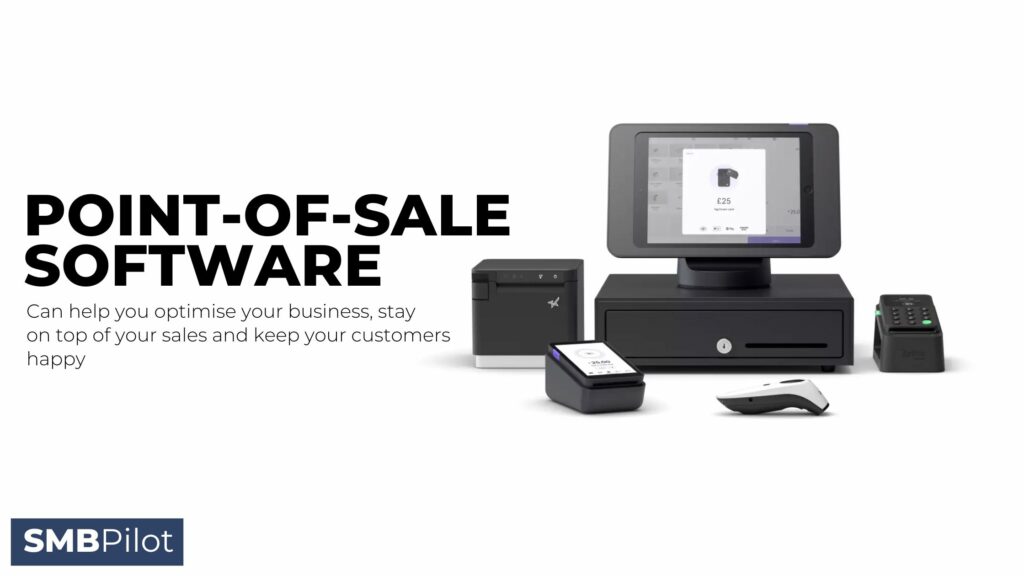
✓ Multi-Platform Compatibility: Zettle works seamlessly on iOS and Android devices, providing flexibility in choosing your preferred operating system.
✓ Contactless Payments: Accept a wide range of payment methods, including contactless cards, mobile wallets, and chip and PIN, providing convenience for both customers and businesses.
✓ Sales Reporting: Gain valuable insights into your business performance with detailed sales reports and analytics, helping you make informed decisions.
✓ Inventory Management: Effortlessly manage your product catalog, track stock levels, and receive low-stock alerts to ensure you never run out of essential items.
✓ Integration with PayPal: Seamlessly integrate Zettle with PayPal for easy online and offline payment management.
✓ Customisable Receipts: Personalise your receipts with your branding and messages to enhance your brand identity.
Zettle Pricing For Retail Businesses
| Pricing Information | Details |
|---|---|
| Card Transaction Fees | Typically range from 1.25% to 1.75% |
| Monthly Subscription Fee | None |
| Hardware Costs | One-time upfront costs may apply |
Zettle by PayPal offers transparent pricing plans tailored to your business needs. While specific rates may vary by location and currency, the pricing structure typically includes:
Card Transaction Fees: A percentage-based fee on each card transaction, usually ranging from 1.25% to 1.75%.
No Monthly Fees: Zettle typically doesn’t charge monthly subscription fees, making it an attractive option for small businesses.
Hardware Costs: Depending on your hardware choices (e.g., card readers, stands), there may be one-time upfront costs.
Pros
User-friendly interface that is easy to set up and use.
Wide range of supported payment methods.
Robust inventory management and sales reporting features.
Integration with PayPal for online and offline payments.
Cons
Transaction fees may vary depending on your location.
Limited advanced features compared to some other POS systems.
Hardware costs can add up if you require multiple devices or accessories.
5. Shopify POS
Shopify Point of Sale, is a comprehensive and versatile solution designed to meet the needs of modern retailers. Whether you operate a small boutique, a bustling store, or an expanding chain of retail locations, Shopify POS offers the tools to streamline your operations, enhance customer interactions, and boost sales.

One of the standout features of Shopify POS is its seamless integration with the broader Shopify ecosystem. This means you can effortlessly manage inventory, sales, and customer data across all your sales channels, including your physical store, online store, mobile app, and even social media platforms. The ability to maintain a single, centralised view of your business simplifies inventory management, reduces the risk of overselling, and allows for consistent customer experiences regardless of where they interact with your brand.
Shopify POS also shines when it comes to customisation and scalability. The software is highly customisable, allowing you to tailor the checkout process, receipts, and branding to align with your unique brand identity. As your business grows, Shopify POS grows with you, offering a range of pricing plans and additional features to support your evolving needs. With intuitive and user-friendly interfaces, quick setup, and 24/7 customer support, Shopify POS empowers retailers to focus on what matters most: delivering exceptional products and service to their customers while driving growth and success.
Features
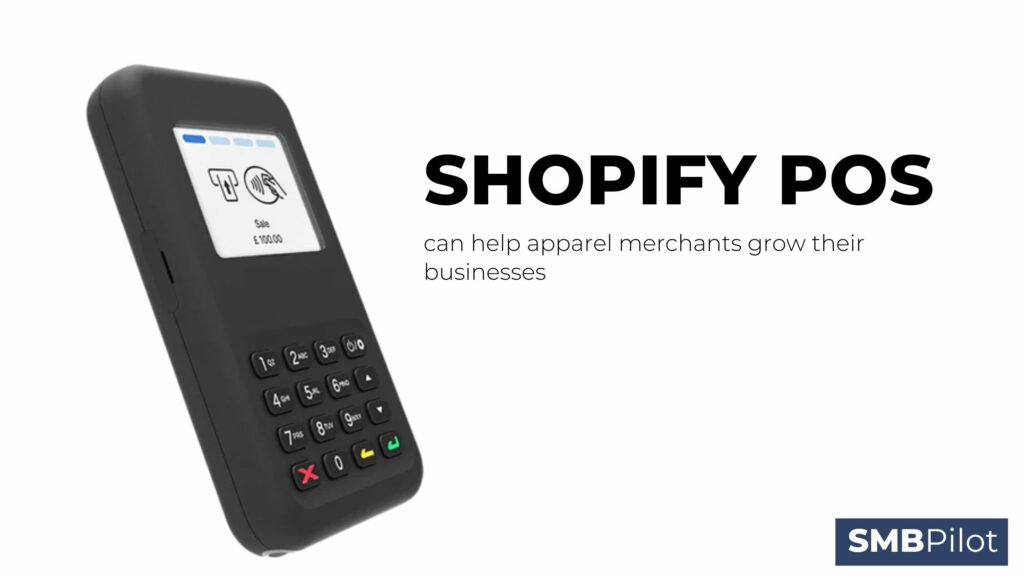
✓ Omnichannel Retail: Shopify POS seamlessly integrates with your online store, allowing you to manage inventory, sales, and customer data across all channels. This means you can sell products online, in-store, at pop-up shops, or even through social media, all from a single platform.
✓ Inventory Management: Keep track of your stock levels in real-time, ensuring that you never run out of popular items. You can also set up low-stock alerts and manage your products efficiently.
✓ Customisable Checkout: Tailor the checkout experience to your brand with customisable receipts and the ability to accept multiple payment methods, including credit cards, mobile wallets, and more.
✓ Robust Reporting: Access detailed sales reports and analytics to gain insights into your business’s performance, customer behavior, and sales trends. Use this data to make informed decisions and optimise your strategies.
✓ Employee Management: Assign staff roles and permissions, track their sales performance, and manage their access to the system, enhancing security and accountability.
Shopify Retail POS Pricing
Shopify POS offers a variety of pricing options, depending on your business needs. The software starts at £23 per month for the Shopify Lite plan, which includes basic features for selling in person and through social media. More advanced plans, such as the Basic Shopify and Shopify plans, offer additional features and start at £23 and £63 per month, respectively. For larger businesses or those with specific requirements, Shopify also offers the Advanced and Shopify Plus plans with custom pricing.
Pricing Options for Shopify POS:
| Plan | Monthly Cost | Key Features |
|---|---|---|
| Shopify Lite | £23/month | Basic features for in-person and social media sales. |
| Basic Shopify | £23/month | Enhanced features for small businesses. |
| Shopify | £23/month | Comprehensive tools for growing businesses. |
| Advanced (Custom) | Custom pricing | Tailored solutions for larger enterprises. |
| Shopify Plus (Custom) | Custom pricing | Enterprise-level features with custom pricing. |
Pros
Seamless Integration: Easily sync your online and offline sales channels, ensuring consistency and efficiency in your retail operations.
User-Friendly: The intuitive interface requires minimal training, allowing your staff to adapt quickly to the system.
Extensive App Ecosystem: Access a wide range of third-party apps and integrations to expand the functionality of your POS system.
Scalability: Shopify POS grows with your business, offering more features and capabilities as you expand.
24/7 Customer Support: Benefit from round-the-clock customer support to address any issues or questions.
Cons
Subscription Costs: While the initial pricing may seem affordable, the costs can increase as you add more features and scale your business.
Transaction Fees: If you choose to use a third-party payment provider instead of Shopify Payments, you may incur additional transaction fees.
Hardware Costs: Purchasing compatible hardware, such as card readers and receipt printers, can be an upfront expense.
Frequently Asked Questions
1. What is a POS system, and why do I need one for my retail business?
A POS (Point of Sale) system is a software and hardware combination used by retailers to complete sales transactions and manage various aspects of their business, such as inventory, customer data, and reporting. It streamlines sales processes, enhances customer experiences, and provides valuable insights for making informed business decisions. A POS system is essential for retailers to improve efficiency, accuracy, and profitability in their operations.
2. What makes Square an attractive choice for retail businesses?
Square is known for its user-friendly interface, transparent pricing, and scalability. It offers a range of hardware options and flexible pricing plans suitable for businesses of all sizes. Square’s rapid setup, integrated reporting, and customisable receipts make it an excellent choice for both new and established retail ventures.
3. How does Lightspeed benefit multi-store retailers?
Lightspeed stands out for its comprehensive feature set, including inventory management, purchase ordering, loyalty programs, and advanced analytics. It excels in real-time inventory synchronisation across multiple locations, reducing shrinkage and enhancing supply chain management. Lightspeed’s ability to create customer profiles and execute personalised marketing campaigns enhances customer engagement, making it ideal for businesses with multiple stores.
4. Is SumUp a suitable POS solution for small retail businesses?
SumUp is a practical choice for small and micro-retail businesses due to its affordability, ease of use, and mobility. It offers a variety of card readers and provides transaction processing for chip and PIN, contactless payments, and mobile wallets. However, it may not be the most cost-effective option for high-volume businesses with complex operational needs.
5. What distinguishes Zettle by PayPal from other POS systems?
Zettle by PayPal offers a versatile and user-friendly POS solution compatible with iOS and Android devices. It supports various payment methods, including contactless cards and mobile wallets. Zettle’s inventory management and sales reporting features make it a valuable choice for retailers. However, its transaction fees and hardware costs may vary by location and add up for businesses requiring multiple devices.
6. How does Shopify POS integrate online and offline sales for retailers?
Shopify POS seamlessly integrates with online stores and various sales channels, allowing retailers to manage inventory, sales, and customer data centrally. This omnichannel approach simplifies inventory management, reduces overselling risks, and ensures consistent customer experiences across different platforms. Shopify POS also offers customisation options, scalability, and 24/7 customer support to meet the evolving needs of retail businesses.
Final Words
Selecting the right Point of Sale (POS) system can be a game-changer for your retail business. Each of the POS solutions we’ve explored offers unique features and pricing models tailored to various business needs. Here’s a brief overview to help you make an informed choice.
Your choice of a POS system depends on your specific needs, budget, and aspirations. Explore these options, reflect on your requirements, and consider personalised demonstrations. Your selection is an investment in your retail business’s success. Share your insights and experiences in the comments to guide fellow retailers toward excellence. Start your journey to retail success today!

